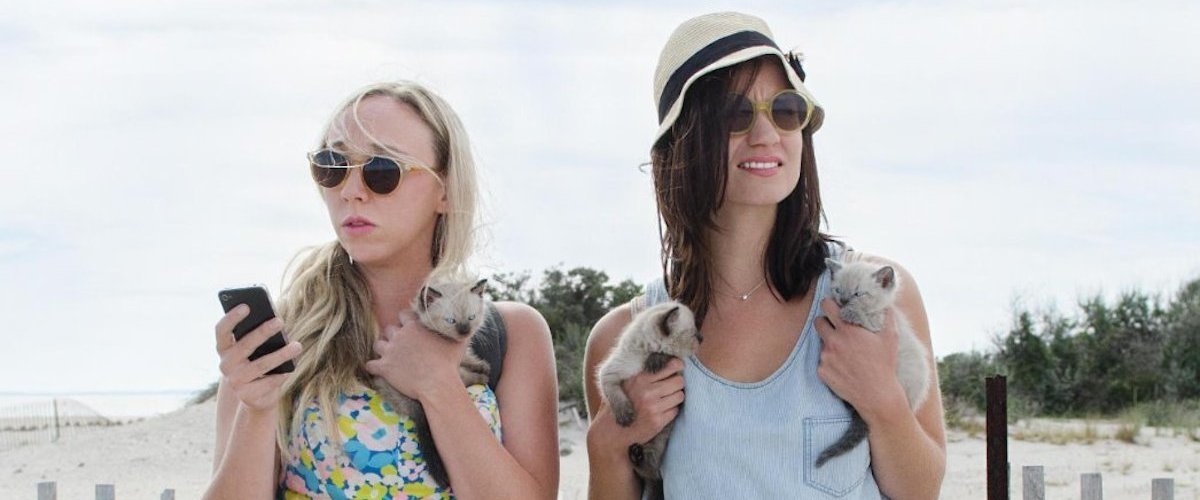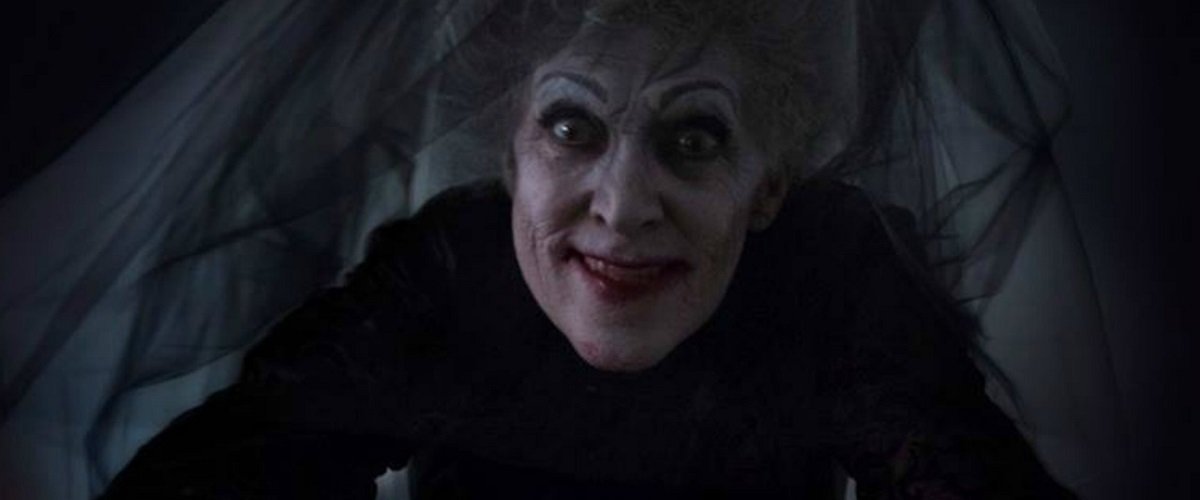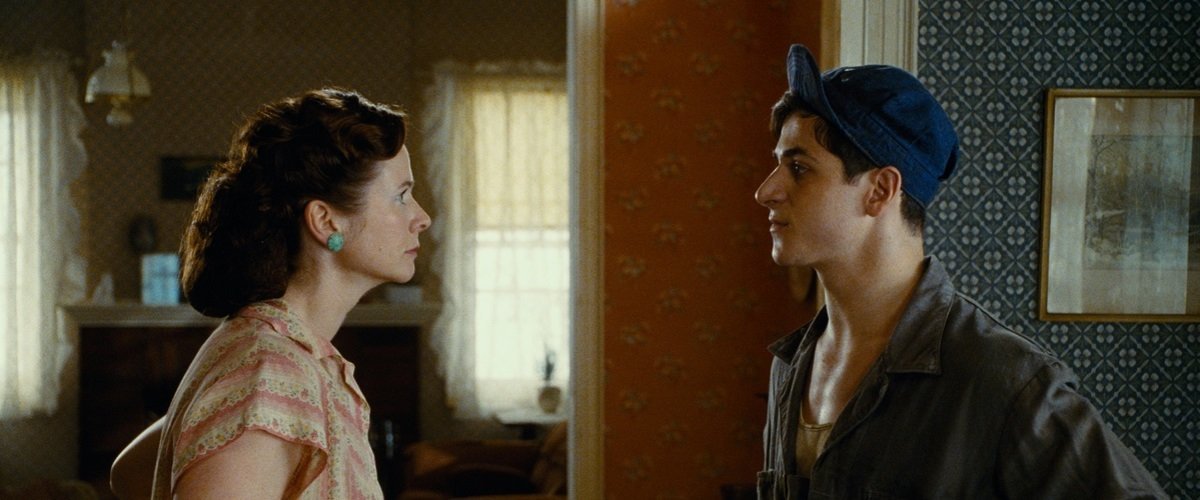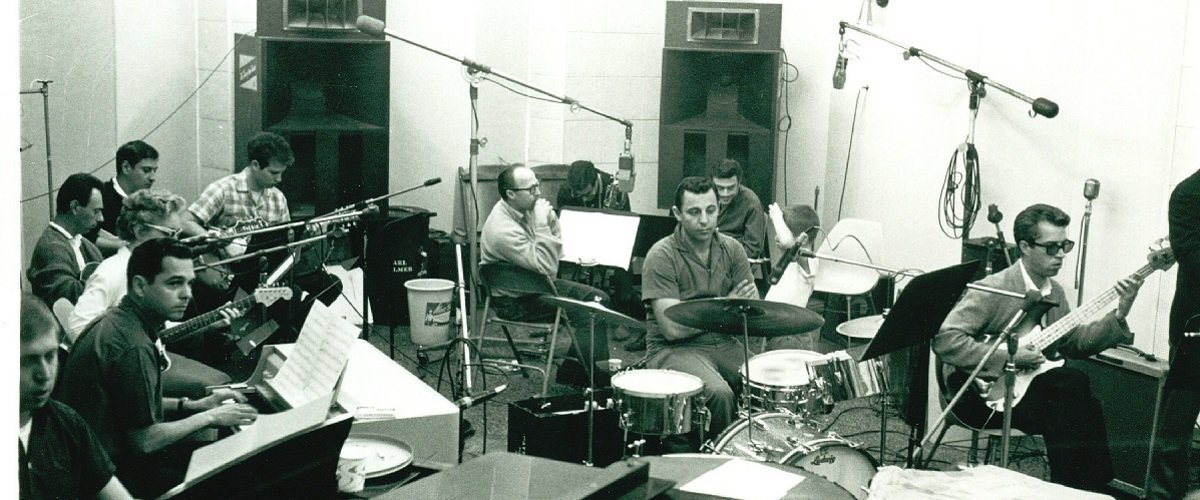This series features the movie questionnaires and reviews from 2015 published by our site’s regular film critics. We continue with critic Christy Lemire, who has reviewed such films as “Far from the Madding Crowd,” “The Overnight,” “Trainwreck” and “While We're Young.” Her Twitter handle is @christylemire.
QUESTIONNAIRE:
Where did you grow up, and what was it like?
Woodland Hills, in the San Fernando Valley section of Los Angeles, in a totally “Brady Bunch”-looking mid-century modern, suburban tract house. This was during the 1970s and ’80s, so “Fast Times at Ridgemont High” feels like a documentary to me.
Was anyone else in your family into movies? If so, what effect did they have on your moviegoing tastes?
My parents were hugely into movies and a massive influence on the career path I’d end up following. My mother loved Fellini and would drive 40 minutes out of her way to the video store in Silver Lake because they had better foreign titles. My father loved Humphrey Bogart and John Wayne and would sing along with all his favorite, classic musicals. They encouraged me to see everything, from back-to-back showings of “The Karate Kid” when I was 12 to “Rebel Without a Cause” in high school to foreign films when I’d come home from college on break.

What’s the first movie you remember seeing, and what impression did it make on you?
In the theater, probably “Bambi.” I recall feeling scared and sad in ways I couldn’t fully comprehend or articulate. At home, repeated showings of “The Sound of Music” and “The Wizard of Oz,” those usual childhood rites of passage. I still sing along with Liesl in the gazebo, and I’m still frightened of the flying monkeys.
What’s the first movie that made you think, “Hey, some people made this. It didn’t just exist. There’s a human personality behind it.
“Gosh, maybe “Star Wars“? It’s such a specific, personal vision and at that point it was unlike anything I’d seen before.
What’s the first movie you ever walked out of?
The first “Saw” movie. It had gotten so much hype, I had to check it out. I wasn’t reviewing it, though. So when the scene came up with the bad guy putting a gun to the heads of a trembling, sobbing mother and daughter, I was just like: “I’m out of here.” I wasn’t even a parent yet—I didn’t even want to be a parent yet—but this felt gratuitous and exploitative to me in a way that was off-putting. I haven’t seen a “Saw” movie since.
What’s the funniest film you’ve ever seen?
“Airplane!”
What’s the saddest film you’ve ever seen?
“Lassie Come Home.” The original and the remake. I sob like a little girl, even though I know there’s going to be a happy ending. (The fact that I had a collie growing up might have something to do with this.)
What’s the scariest film you’ve ever seen?
“The Shining.”
What’s the most romantic film you’ve ever seen?
“Casablanca.”
What’s the first television show you ever saw that made you think television could be more than entertainment?
“Moonlighting.”
What book do you think about or revisit the most?
Probably whatever I’m reading to my 4-year-old. These days, something by Mo Willems.
What album or recording artist have you listened to the most, and why?
Growing up: Depeche Mode, The Smiths. More recently: the Pixies, Radiohead.
Is there a movie that you think is great, or powerful, or perfect, but that you never especially want to see again, and why?
“Requiem for a Dream.” It’s just so draining.
What movie have you seen more times than any other?
What was your first R-rated movie, and did you like it?
My mom let me see “Fame” when I was 7 years old. My friends and I all loved the music, but I also recall thinking how racy it seemed and how very grown-up I felt for having seen it.
What’s the most visually beautiful film you’ve ever seen?
Anything by Wong Kar-wai. Specifically, “In the Mood for Love.”
Who are your favorite leading men, past and present?
Humphrey Bogart, George Clooney.
Who are your favorite leading ladies, past and present?
Who’s your favorite modern filmmaker?
The Coen brothers.
Who’s your least favorite modern filmmaker?
What film do you love that most people seem to hate?
Probably “Grease 2” or “Xanadu.” I know they’re terrible but I can’t resist the guilty-pleasure aspect of them.
What film do you hate that most people love?
I certainly don’t hate this movie, but I don’t get the allure of “Synecdoche, NY,” the way most people do.

Tell me about a moviegoing experience you will never forget—not just because of the movie, but because of the circumstances in which you saw it.
Rewatching “I Am Love” at the Virginia Theater at Ebertfest a few years ago was pretty great. It’s such a gorgeous theater and seeing the film projected on that big, beautiful screen made the lushness of it all even more vibrant.
What aspect of modern theatrical moviegoing do you like least?
The need to text/tweet/check email during movies. The fact that it’s a totally acceptable practice among younger viewers is very discouraging.
What aspect of moviegoing during your childhood do you miss the most?
The surge of independence that going to the movies without a parent provided.
Have you ever damaged a friendship, or thought twice about a relationship, because you disagreed about whether a movie was good or bad?
Not at all. Disagreement is part of the fun.
What movies have you dreamed about?
None that I can remember, surprisingly.
What concession stand item can you not live without?
I don’t tend to eat while I watch movies! Maybe because I’ve reviewed them for a living for so long, and I usually need to have my hands free to write. But I won’t say no if someone offers me a handful of peanut M&M’s.
REVIEWS:

Aloha *1/2
You can see the editing, and not in a good way. It’s obvious in big developments that make you go: “Huh?” but also within individual scenes, with cutaways to different camera angles that disrupt the flow of dialogue. And the dialogue itself […] so frequently strains for his signature poignancy that it feels like a parody of a Crowe script.

American Ultra *1/2
Mixing such disparate genres requires a more deft hand than the one on display from director Nima Nourizadeh, whose previous feature is the found-footage, high-school pukefest “Project X.” “American Ultra” has far more sophisticated production values than that first film—then again, so does your average wedding video—but it’s just as bludgeoning. Yet the script from Max Landis (“Chronicle”) starts out with all the grungy, morose trappings of your typical small-town, indie drama.

Before We Go *1/2
[Chris] Evans clearly has some solid artistic instincts here, and it’s nice to see him shift gears and make a small, intimate film for his first outing as director. Hopefully the next time he’s between blockbusters and in need of a creative outlet, he’ll have a better stack of scripts to consider.

The Boy Next Door *1/2
Only the insane (and insanely violent) climactic showdown, in a burning barn, of all places, finally gives the people what they want. You’ll howl, you’ll squirm, you’ll applaud with disgusted glee – and you’ll wish that the rest of the film were that much fun.

A Brave Heart: The Lizzie Velasquez Story ***
[Sara] Bordo’s documentary is extremely straightforward and doesn’t attempt anything ambitious artistically. Still, [Lizzie] Velasquez is abidingly pleasant company for the film’s brief running time—and the purity of her message is undeniable.

Dior and I ***
Where [fashion designer Raf Simons] is comfortable –- and where his vision and authority are quite clear – is behind the scenes. And that’s where French filmmaker Frederic Tcheng spends the majority of time in his eye-opening, solo directing debut.

The DUFF ***
[Mae] Whitman displays flawless comic timing and consistently makes inspiring choices in terms of delivery, reaction, even the slightest facial expression. She shines confidently in a self-deprecating role, and it’s irresistible.

Far from the Madding Crowd ***
Thomas Vinterberg creates a rich aesthetic that combines both vibrant colors and intimate natural light. Whether his film is lush or rolling in the muck, it always has a tactile quality that makes it accessible, which is also true of the performances from his (mostly) well-chosen cast.

5 Flights Up **
What begins as a sweetly sentimental story ends up being cloyingly melodramatic. It’s also as crammed and cluttered as an overpriced New York City studio.

Focus ***
As a veteran con man, [Will] Smith seems looser—charming as ever but also broken, commanding yet vulnerable. It’s as if he’s finally shifted into the right gear as he settles into middle age—good lord, is the eternally boyish and buoyant Smith approaching 50?—and he’s comfortable there.

Fort Tilden ***
As much as [Sarah-Violet] Bliss and [Charles] Rogers are indicting the worst qualities of today’s post-collegiate generation, they also seem interested in exploring how young people use cynicism or cruelty to deflect their own insecurity or fear of responsibility. When Allie describes a song as “tediously adorable,” the intriguing contradiction is all-too fitting.

The press notes tout “18 intensive months” of shooting and promise “an intimate portrait” of this extraordinary young woman. But while we do indeed see the normalcy of her home life with her parents and younger brothers and the regular, teenage-girl instincts that exist alongside her courage, we never get a glimpse into her deeper feelings.

The Humbling **1/2
Al Pacino gives a refreshingly quiet and understated performance with poignant moments of vulnerability. It is the most consistent factor in a film that is frustratingly inconsistent.

I leapt out of my seat and grabbed the arm of the critic sitting next to me so often (and he did the same, although he shall remain nameless) that you’d think we’d never seen a horror movie before. [Leigh] Whannell’s imagery is that solidly creepy and his pacing is that precise. He indulges in a few artsy camera angles and movements, but mostly directs in able and understated fashion.

Last Knights *1/2
Japanese director Kazuaki Kiriya’s film might feature some handsome staging and solid production values, but it’s hard to tell. His film is relentlessly dreary and bleak, smothered in a gray sameness and often obscured by pseudo-artful, slow-motion raindrops or snowfall. This is a VERY serious film, in case you couldn’t tell.

Little Boy *1/2
It’s meant to be a tale of uplift for faith-based audiences, but instead wears viewers down with a heavy-handed narrative, an overbearing score and voiceover that spells out everything in cringe-inducing, folksy tones.

The Little Death *1/2
It toys with the idea of being racy and dabbles in dark humor. Similarly, it flits around several couples struggling with intimacy issues and it meanders between various types of tone. Basically, it won’t commit.

Love, Rosie **
“Love, Rosie” is one of those annoying movies in which everything would be just fine if the two central characters had a simple conversation that cleared up all their misunderstandings. But then, there would be no movie – although, in retrospect, that might not be such a bad thing.

“Madame Bovary” is never less than lovely to look at. Cinematographer Andrij Parekh’s melancholy images seamlessly combine muck and luxury, sometimes within the same image, […] and the clothes are gorgeous. […] But the lavish aesthetic trappings, combined with the emotional emptiness, only combine to make Barthes’ film feel like “Madame Bovary: The Fashion Show.”

Maze Runner: The Scorch Trials *1/2
The mythology in these dystopian young adult novels-turned-films can be dense at times, but “Maze Runner: The Scorch Trials” crams in more lore, supporting characters, backstories and motivations to the extent that it becomes difficult to get a grasp on anything.

Monkey Kingdom ***
“Monkey Kingdom,” directed by series veterans Mark Linfield and Alastair Fothergill, strikes a nice balance between these two instincts. You’re likely to laugh and learn in equal measure–and so will your little ones.

The Overnight ***
Brice’s brisk and beguiling little indie takes you in various directions over the course of a long evening, but not necessarily the ones you might expect. You may think you know where a certain scene is headed—and it doesn’t go there, or it goes there with a slight twist or detour. His film is deft and delicate and exquisitely uncomfortable, but it also offers revelations that are joyful, sad and true.

Paddington ***
“Paddington,” a live-action/CGI-animated take on the tales of the beloved stuffed bear, pulls off a pretty tricky balancing act. It manages to be both old-fashioned and high-tech. It remains faithful to the character’s roots while also placing him firmly within a contemporary setting. It’s charmingly funny and shamelessly puny.

Paul Blart: Mall Cop 2 Zero Stars
Think of the worst movie you’ve ever seen – a movie that didn’t make you laugh, didn’t make you cry, didn’t move you or change you in any way besides giving you the desperate urge to flee the theater. Think of a movie that was a massive waste of your time and money. Hold that title in your mind. “Paul Blart: Mall Cop 2” is worse than that.

“The Perfect Guy” is decent trash that could have been delicious trash with a little more daring. Director David M. Rosenthal’s film—which, tellingly, Sony did not screen for critics before opening day—is slick, glossy and sturdily made in a way that’s reminiscent of similar sexy-stalker fare from the 1990s.

The Second Best Exotic Marigold Hotel *1/2
Maybe these seasoned stars thought it would be fun to return to these characters in this setting once more. But the result feels strained and slapped together, crammed as it is with silly mistaken identities and misunderstandings, adolescent jealousies and slapstick jokes. It’s a sitcom in a sari.

The SpongeBob Movie: Sponge Out of Water **1/2
Zany and zippy as you’d expect, “The SpongeBob Movie: Sponge Out of Water” remains true to the surrealism of its animated television roots. But it also tries to force a live-action element which isn’t as comfortable a fit as a certain pair of symmetrical trousers.

Strangerland **
If only [Nicole Kidman’s] performance were in the service of a better film. Director Kim Farrant’s debut feature is beautifully shot and offers some powerful, well-acted moments from a strong cast, but it’s just relentlessly dreary.

Trainwreck ***
“Trainwreck” isn’t as quite as subversive as it suggests at the outset. The grand finale is extraordinarily cheesy, albeit in a self-aware and entertaining way. But the movie finds its own place of peace, on its own terms, and every bit of it is earned. Don’t be ashamed if you find yourself getting a little choked up, too.

Unexpected ***
[Kris] Swanberg finds a pleasingly low-key tone throughout the film, which (blissfully) is especially true during the kinds of moments that usually are played for wacky laughs in pregnancy comedies. (Peeing on a stick, puking in a trashcan, dashing to the hospital, etc.) And the bond that forms between [Cobie] Smulders’ character, Samantha, and Gail Bean as the teenage Jasmine feels tender, genuine and unforced.

Let’s put it this way: If you’re at the multiplex in the middle of the afternoon, and “The Wedding Ringer” is the only movie playing at a time that’s convenient, you won’t be completely miserable. This is not exactly a ringing endorsement, I realize. But you take life’s tiny pleasures where you can find them.

“While We’re Young” searches for the blurry line we all cross once we’ve entered middle age, finds it and tramples all over it, but it does so with kindness for those of us who’ve made that inevitable journey and survived with some dignity intact.

The Wrecking Crew **1/2
“The Wrecking Crew” is mostly about uplift, however—almost monotonously so. It aims to enlighten and inspire by shining a spotlight on the folks who toiled in the background for too long.

Zipper **
This second feature from director and co-writer Mora Stephens has all the stylistic and thematic trappings of a made-for-cable movie you’d watch late at night and hate yourself for in the morning. But it also strives, kinda, to be a serious political drama and to make a statement about the public’s tendency to rush to judgment in the face of hypocrisy.












